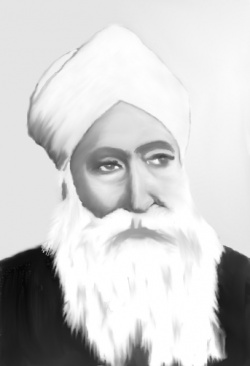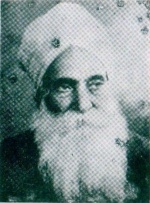Giani Hira Singh Dard: Difference between revisions
(New page: '''Giani Hira Singh Dard''' (1889 - 1965), journalist and author, who in his early youth began writing religious and patriotic poetry in Punjabi under the pseudonym of "Dard", later absor...) |
No edit summary |
||
| (16 intermediate revisions by 3 users not shown) | |||
| Line 1: | Line 1: | ||
'''Giani Hira Singh Dard''' (1889 - 1965), journalist and author, who in his early youth began writing religious and patriotic poetry in Punjabi under the pseudonym of "Dard", later absorbed into his name, was born on 30 September 1889 in the village of Ghaghrot, in Rawalpindi district, now in Pakistan. His father | {{p|File:Bhaihirasinghdard-mod5.jpg|Giani Hira Singh Dard}} | ||
Hira Singh took part in the agitation for the restoration of the wall of Gurdwara | |||
When | '''Giani Hira Singh Dard''' (30 September 1889 - 22 June 1965), journalist and author, who in his early youth began writing religious and patriotic poetry in Punjabi under the pseudonym of "Dard", later absorbed into his name, was born on 30 September 1889 in the village of Ghaghrot, in Rawalpindi district, now in Pakistan. The word "Dard" means "pain" in [[Punjabi]] and is used to signify a state of "hurt"; a person who is "hurt" with the state of the world, for example. | ||
During those early years of the freedom movement in the country, Hira Singh served as secretary of the Sikh League and as a member of the Shiromani Gurdwara Parbandhak Committee, Amritsar. He was also a member of the Punjab Provincial Congress Committee as well as of the | |||
After the partition of the Punjab in 1947, he settled in Jalandhar and revived the | |||
1952. and Mendn Kujh Itihdsik Ydddn (Some of My Historical Reminiscences), 1955. He tried his hand at short story writing also and published, in 1953, a slender volume As di Tand te Hor Kahdmdn (The Thread of Hope and Other Stories). His Punjabi Sdhit da | == Family history == | ||
His great grand father Bhai Bir Singh Pandha(Upadhaya) migrated to [[Pathohar]] from [[Poonch]], [[Jammu & Kashmir]]. Bhai Bir Singh's son Bhai Sant Singh had settled in village Ghaghrot, Rawalpindi. Giani Hira Singh was a son of Bhai Hari Singh who was the son of Bhai Sant Singh. Bhai Hari Singh ( Giani Hira Singh Dard's father) was the first Sikh to start spreading Sikhism in their area. Giani Hira Singh's family originally belonged to Brahmin family of Poonch who adopted Sikh way of life in Pathohar. | |||
'''Family Tree of Giani Hira Singh Dard''': | |||
* Bhai Bir Singh Pandha(Upadhaya) | |||
* Bhai Sant Singh | |||
* Bhai Hari Singh | |||
* Giani Hira Singh Dard | |||
== Education == | |||
Hira Singh attended the Christian Mission School at Rawalpindi and in 1907 he was appointed an octroi (clerk) in the local Municipal Committee which employment he resigned to become a teacher at the Singh Sabha school at Chakk No 73J.B., in Lyallpur district. While working at the school, he passed the Vidvan (Proficiency), and Giani (Honours) examinations in Punjabi from the Panjab University, Lahore. During this period, he wrote poems on Sikh historical personages and events of which two collections Upkdrdn di Vannagi (Samples of the Deeds of Charity) and Sikh Bachchio Jago (Wake up Sikh Youth), were published in 1912 and 1913, respectively. | |||
== Participation in Sikh causes == | |||
Hira Singh took part in the agitation for the restoration of the wall of [[Gurdwara Rakab Ganj]] demolished by the British. He brought out a pamphlet on this issue which excited the entire Sikh community. He was among those who, in 1915, held a recitation of the Guru Granth Sahib in his school and offered prayers for the [[Komagata Maru]] passengers who had fallen martyrs to British bullets at Budge Budge Ghat of the Hugli in Calcutta. For this he had to undergo arrest. | |||
== Accomplishments and arrests == | |||
When [[Master Sunder Singh Lyallpuri]] started the Punjabi daily, Akali in 1920 at Lahore with Mangal Singh Gill as editor, Hira Singh Dard was appointed an assistant editor. The newspaper was strongly anti government and Hira Singh had to undergo a series of imprisonments. Coming out of jail in 1924, he launched a literary monthly "Phulwari", which was to become a landmark in Punjabi letters. The Phulwari was published from [[Amritsar]] up to 1930 and thereafter, till its cessation in 1942, from [[Lahore]], when Hira Singh was arrested in the Quit India movement. | |||
During those early years of the freedom movement in the country, Hira Singh served as secretary of the Sikh League and as a member of the [[Shiromani Gurdwara Parbandhak Committee]], Amritsar. He was also a member of the Punjab Provincial Congress Committee as well as of the All India Congress Committee. He was one of the founders, with Sir Shahab ud'Din and Shri S.P. Singha, of the Punjabi Sabha. | |||
After the partition of the Punjab in 1947, he settled in Jalandhar and revived the Phulwari. His views were now pronouncedly leftist. | |||
== Notable Publications of Giani Hira Singh Dard == | |||
His publications of this later period include verse collections, Hor Agere (Yet Further), 1950, and Chonave Dard Sunehe (Selected Messages from Dard), 1954, Panth, Dharam te Rdjniti (Panth, Religion and Politics), 1950, Nava Bharat de RdjaslAgu (Political Leaders of New India), 1952. and Mendn Kujh Itihdsik Ydddn (Some of My Historical Reminiscences), 1955. He tried his hand at short story writing also and published, in 1953, a slender volume As di Tand te Hor Kahdmdn (The Thread of Hope and Other Stories). His Punjabi Sdhit da Itihas (History of Punjabi Literature), | |||
1953. written from the Marxist point of view, was chiefly meant as a textbook for students. He visited Malaya in 1938 and combining his experiences in that country with those of nearer home, he published a travel diary, Brijbhumi te Malaya di Ydtrd, 1958. | 1953. written from the Marxist point of view, was chiefly meant as a textbook for students. He visited Malaya in 1938 and combining his experiences in that country with those of nearer home, he published a travel diary, Brijbhumi te Malaya di Ydtrd, 1958. | ||
Hira Singh died after a long illness on 22 June 1965 at Jalandhar. | |||
Hira Singh died after a long illness on 22 June 1965 at [[Jalandhar]]. | |||
==See also== | |||
[[File:Bhaihirasinghdard.jpg|thumb|150px|right|Giani Hira Singh Dard .]] | |||
* [[Master Sunder Singh Lyallpuri]] | |||
* [[Gurdwara Rakab Ganj]] | |||
* [[Komagata Maru]] | |||
==External links== | |||
* [http://worldsikhnews.com/18%20June%202008/Giani%20Hira%20Singh%20Award%20to%20Punjabi%20Sahit%20Sabha%20California.htm Giani Hira Singh Award to Punjabi Sahit Sabha California Award ceremony to be held on 6 July ] | |||
==References== | ==References== | ||
1. Mohan Singh, History of Punjabi Literature (1100-1932). Amritsar, 1956 | *1. Mohan Singh, History of Punjabi Literature (1100-1932). Amritsar, 1956 | ||
*2. Piar Singh, Tejd Singh Samundri. Amritsar, 1975 | |||
*3. Dard, Hira Singh, Merlon Kujh Itihasik Yadan. Jalandhar, 1955 | |||
*4. http://sikhiwiki.org/index.php/Master_Sunder_Singh_Lyallpuri | |||
{{Giani}} | |||
[[Category: Poets]] | |||
Latest revision as of 12:31, 31 August 2015
Giani Hira Singh Dard (30 September 1889 - 22 June 1965), journalist and author, who in his early youth began writing religious and patriotic poetry in Punjabi under the pseudonym of "Dard", later absorbed into his name, was born on 30 September 1889 in the village of Ghaghrot, in Rawalpindi district, now in Pakistan. The word "Dard" means "pain" in Punjabi and is used to signify a state of "hurt"; a person who is "hurt" with the state of the world, for example.
Family history
His great grand father Bhai Bir Singh Pandha(Upadhaya) migrated to Pathohar from Poonch, Jammu & Kashmir. Bhai Bir Singh's son Bhai Sant Singh had settled in village Ghaghrot, Rawalpindi. Giani Hira Singh was a son of Bhai Hari Singh who was the son of Bhai Sant Singh. Bhai Hari Singh ( Giani Hira Singh Dard's father) was the first Sikh to start spreading Sikhism in their area. Giani Hira Singh's family originally belonged to Brahmin family of Poonch who adopted Sikh way of life in Pathohar.
Family Tree of Giani Hira Singh Dard:
- Bhai Bir Singh Pandha(Upadhaya)
- Bhai Sant Singh
- Bhai Hari Singh
- Giani Hira Singh Dard
Education
Hira Singh attended the Christian Mission School at Rawalpindi and in 1907 he was appointed an octroi (clerk) in the local Municipal Committee which employment he resigned to become a teacher at the Singh Sabha school at Chakk No 73J.B., in Lyallpur district. While working at the school, he passed the Vidvan (Proficiency), and Giani (Honours) examinations in Punjabi from the Panjab University, Lahore. During this period, he wrote poems on Sikh historical personages and events of which two collections Upkdrdn di Vannagi (Samples of the Deeds of Charity) and Sikh Bachchio Jago (Wake up Sikh Youth), were published in 1912 and 1913, respectively.
Participation in Sikh causes
Hira Singh took part in the agitation for the restoration of the wall of Gurdwara Rakab Ganj demolished by the British. He brought out a pamphlet on this issue which excited the entire Sikh community. He was among those who, in 1915, held a recitation of the Guru Granth Sahib in his school and offered prayers for the Komagata Maru passengers who had fallen martyrs to British bullets at Budge Budge Ghat of the Hugli in Calcutta. For this he had to undergo arrest.
Accomplishments and arrests
When Master Sunder Singh Lyallpuri started the Punjabi daily, Akali in 1920 at Lahore with Mangal Singh Gill as editor, Hira Singh Dard was appointed an assistant editor. The newspaper was strongly anti government and Hira Singh had to undergo a series of imprisonments. Coming out of jail in 1924, he launched a literary monthly "Phulwari", which was to become a landmark in Punjabi letters. The Phulwari was published from Amritsar up to 1930 and thereafter, till its cessation in 1942, from Lahore, when Hira Singh was arrested in the Quit India movement.
During those early years of the freedom movement in the country, Hira Singh served as secretary of the Sikh League and as a member of the Shiromani Gurdwara Parbandhak Committee, Amritsar. He was also a member of the Punjab Provincial Congress Committee as well as of the All India Congress Committee. He was one of the founders, with Sir Shahab ud'Din and Shri S.P. Singha, of the Punjabi Sabha. After the partition of the Punjab in 1947, he settled in Jalandhar and revived the Phulwari. His views were now pronouncedly leftist.
Notable Publications of Giani Hira Singh Dard
His publications of this later period include verse collections, Hor Agere (Yet Further), 1950, and Chonave Dard Sunehe (Selected Messages from Dard), 1954, Panth, Dharam te Rdjniti (Panth, Religion and Politics), 1950, Nava Bharat de RdjaslAgu (Political Leaders of New India), 1952. and Mendn Kujh Itihdsik Ydddn (Some of My Historical Reminiscences), 1955. He tried his hand at short story writing also and published, in 1953, a slender volume As di Tand te Hor Kahdmdn (The Thread of Hope and Other Stories). His Punjabi Sdhit da Itihas (History of Punjabi Literature),
1953. written from the Marxist point of view, was chiefly meant as a textbook for students. He visited Malaya in 1938 and combining his experiences in that country with those of nearer home, he published a travel diary, Brijbhumi te Malaya di Ydtrd, 1958.
Hira Singh died after a long illness on 22 June 1965 at Jalandhar.
See also
External links
References
- 1. Mohan Singh, History of Punjabi Literature (1100-1932). Amritsar, 1956
- 2. Piar Singh, Tejd Singh Samundri. Amritsar, 1975
- 3. Dard, Hira Singh, Merlon Kujh Itihasik Yadan. Jalandhar, 1955
- 4. http://sikhiwiki.org/index.php/Master_Sunder_Singh_Lyallpuri


